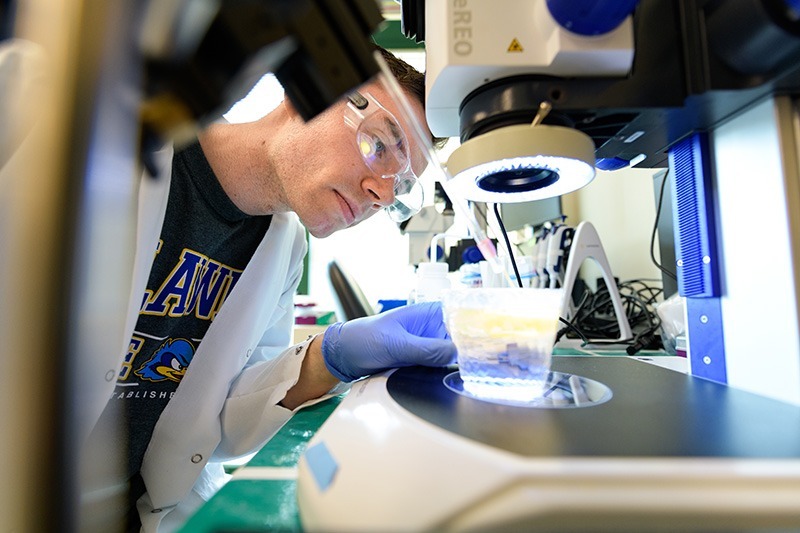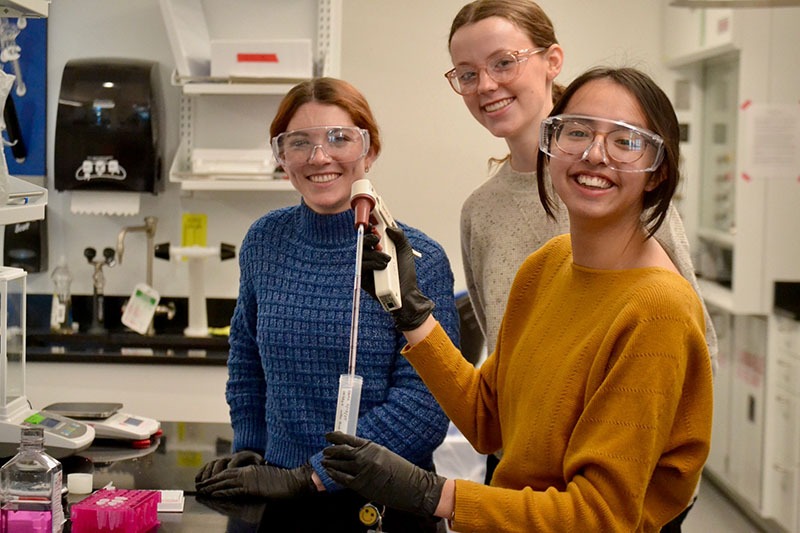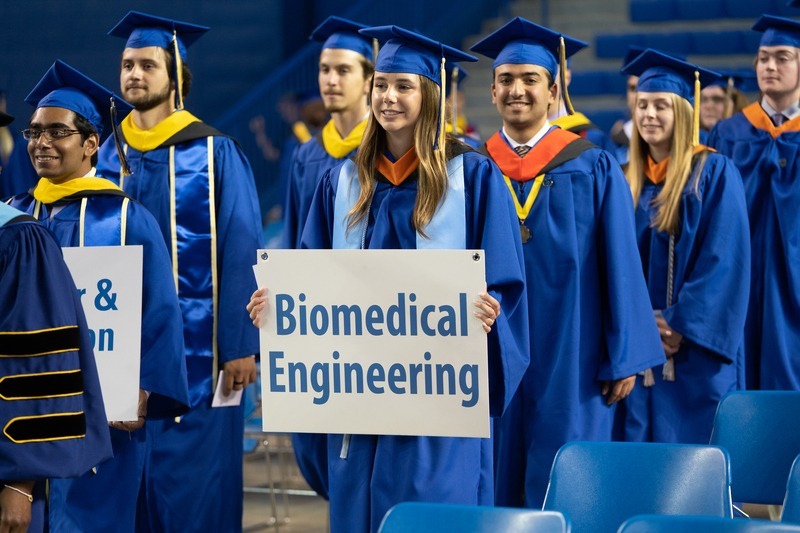Undergraduate Program
Why Major in Biomedical Engineering?
The University of Delaware Biomedical Engineering program is recognized for its small class sizes and focused community. Students develop strong relationships with their professors and gain valuable research experience, often leading to well-paying internships in the industry.
Our Curriculum
Join our Biomedical Engineering program and earn your degree in just four years. At UD, we provide you with a strong foundation in mathematics and science, along with the technical skills needed to tackle real-world biomedical challenges.
You’ll learn to identify, formulate, and solve engineering problems while conducting hands-on laboratory experiments and analyzing data. Our curriculum emphasizes problem-based learning and professional ethics, ensuring you’re ready to make a positive impact in the field.
You’ll develop effective-communication skills and the ability to work collaboratively in multidisciplinary teams. Graduates are well prepared for rewarding careers in biomedical engineering and related fields or for further studies in medical school, engineering graduate programs, and more.
Take the first step toward a fulfilling career in healthcare innovation — explore the Biomedical Engineering program at UD today!
Lauren Mottel
BME ’24
Lauren was a UD Honors Biomedical Engineering major
and is a current graduate student.
I found that the department fostered an ambitious yet thoughtful and creative environment — I felt like I had a lot of space to grow and explore how all of these disciplines connect to one another in different ways.
Sample Curriculum
First Year
FALL
MATH241 Analytic Geometry and Calculus A
BISC207 Introductory Biology I
CHEM103/133 General Chemistry I Lecture/Lab
EGGG101Introduction to Engineering (FYE)
Breadth Requirement Elective
SPRING
MATH242 Analytic Geometry and Calculus B
CISC106 General Computer Science for Engineers
CHEM104/134 General Chemistry II Lecture/Lab
ENGL110 First-Year Writing
BMEG100 Fundamentals in Biomedical Engineering
BMEG111 Cell & Tissue Engineering
Sophomore
FALL
MATH243 Analytic Geometry and Calculus C
BMEG341 Biomedical Experiment Design & Analysis
CHEM321 Organic Chemistry I
CHEM325 Organic Chemistry Lab I
PHYS203 Fundamentals of Physics with Biomedical Applications I
SPRING
MATH305 Applied Math for Biomed, Chem and Biomol Eg
BMEG230 Circuits, Signals and Systems for Biomedical Applications
BMEG260 Intro to Medical Device Design
BMEG301 Quantitative Cellular Physiology
PHYS204 Fundamentals of Physics with Biomedical Applications II
Junior
FALL
BMEG302 Quantitative Systems Physiology
BMEG310/309 Bioengineering Mechanics I Lecture/Lab
BMEG330 Biomedical Instrumentation
MSEG201 Materials Science for Engineers
Technical Electives
SPRING
BMEG311 Bioengineering Mechanics II
BMEG340 Biomedical Modeling and Simulation
BMEG360 BME Junior Design
BMEG420 Biological Transport Phenomena
Technical Electives
Senior
FALL
BMEG460 Biomedical Engineering Design (DLE & Capstone)
Technical Electives
Breadth Requirement Electives
SPRING
PHIL444 Medical Ethics
Technical Electives
Breadth Requirement Electives
To learn more about the curriculum go to the UD Course Catalog.
Focus Areas
Focus areas are optional groupings of technical electives that demonstrate depth in a particular engineering skill set. They are not required, and they do not go on your transcript. Selecting a focus area will help you better develop and articulate your strengths as an engineer, help you tailor your educational experience to your individual BME interests, and guide your discussions with your faculty or academic advisor (e.g., when planning courses or discussing research or internship opportunities).
We have developed 4 focus area handouts:
Minors
BME students can add on minors from the College of Engineering or any other department. A minor is a specified degree pathway, sometimes requiring that you take additional courses to fulfill the requirements.
Some popular minors for BME majors are:
- Biomechanical Engineering
- Computer Science
Hands-on Design-focused Curriculum
BME students will work on real-world problems from day one culminating in a senior capstone project developed with industry partners. Students can participate in a clinical-immersion course enabling aspiring biomedical engineers to shadow health care professionals, observe clinical practices, and identify unmet clinical needs.
Enrichment Programs
Complement your major with the UD Honors College, Grand Challenges for Engineers, Cybersecurity Scholars, or one of our other unique Scholars and Fellows programs. These programs are looking for students like you who think creatively and are ready to push the boundaries of their intellectual curiosity. Learn more about Enrichment Opportunities
4+1 Programs
Save time and money by pursuing an accelerated bachelor’s plus master’s degree. You can take graduate courses in your senior year allowing you to earn both degrees in as little as five years — and boost your career opportunities. Learn more about 4 + 1 Programs
Study Abroad
In today’s increasingly complex and interconnected world, innovative engineers and computer scientists with the soft skills to work in cross-cultural environments will be in high demand by employers. Study abroad in more than 40 countries for a semester or special session or become a World Scholar to incorporate global experiences from your first semester to graduation.
Undergraduate Research
We strongly encourage students to get involved in undergraduate research early, as it’s one of the best ways to enhance your CV and build valuable skills. By engaging in research year-round, you’ll not only deepen your understanding of your field but also gain hands-on experience that sets you apart.
Supporting Your Success
You’ll be supported on your journey by advisors and mentors both from the department and the College of Engineering Academic Advising which can provide you with access to all the services UD has to keep you on track to graduation.
Resources to Inspire Successful Engineers is a support network dedicated to your success as a student from an underrepresented group. Open to all students, RISE offers academic scholarships, professional development opportunities, personalized academic advising and study groups.
More than a degree
Going to college is more than classes, homework and labs. During your time on University of Delaware’s campus, you’ll make lifelong friends and discover new interests.
Meet new people with similar interests. UD’s College of Engineering is home to 30 student organizations focused on engineering and computing, and there are plenty more clubs to join throughout Student Central.
Blue Hens Succeed
98%
Secured employment after graduation
$75K
Average starting salary for students starting their first full-time position after graduation
1/3
of undergraduates participate in study abroad before graduation.
Career & Post-Graduate Success
We’ll prepare you to launch into a career in industry, graduate, or professional school. A third of our undergraduates attend graduate school and many pursue medical or dental school.
- Penn State University
- Georgia Tech
- University of Maryland
- University of Virginia
- University of Pittsburgh
- Stanford University
- Northwestern University
- Northeastern University
For students interested in applying to medical school or dental school, or in gaining an MD/PhD after they graduate, resources can be found at the Center for Health Profession Studies. If you are interested in these careers, there are many professional associations, community-specific resources and related Registered Student Organizations (RSOs) to help direct you along your career path in health sciences and related industries.
Design a better tomorrow.
Health.
Step directly into real healthcare environments, work alongside surgeons and clinicians at leading medical centers, and use your engineering skills to identify unmet needs and design life-changing innovations that improve patient care—our Clinical Immersion course is your chance to turn passion into impact.
Technology.
In our program, students tackle industry-sponsored senior design projects and cutting-edge research—designing surgical tools, wearable devices, biomaterials, and robotics—gaining hands-on experience from concept to prototype while making real contributions to human health before they even graduate.
Society.
Through student-led groups like Assistive Medical Technologies and Engineers Without Borders, our Biomedical Engineering undergraduates design life-changing devices and sustainable health solutions that improve lives locally and globally—gaining leadership, compassion, and the skills to make a lasting impact.
You are one of us.
Imagine a learning environment where small class sizes ensure you’re never just a face in the crowd, where personalized attention from passionate professors sparks deeper understanding and confidence. Here, teamwork isn’t just encouraged; it’s the heartbeat of every class, helping you develop collaboration skills that employers value. Our vibrant community connects you with supportive peers and mentors who celebrate your growth every step of the way. Plus, with easy access to faculty mentors, you have all the guidance and support you need to succeed academically and thrive personally. Choose a place where you belong, grow, and excel, because your future deserves nothing less.
Your degree. Endless Possibilities.
You’ll be ready to tackle any problem.
Our Biomedical Engineering program offers both breadth and depth in education, ensuring you gain a comprehensive understanding across multiple disciplines while diving deep into specialized topics. Many of our students actively participate in undergraduate research, giving them hands-on experience that enriches their learning and sparks innovation. Our curriculum is thoughtfully interwoven, connecting every course through integrated BME real-world problem solving, so you see how concepts come together in practice. Graduating from our program means you’re equipped with a diverse set of skills and knowledge, preparing you to become anything you aspire to, whether that’s in healthcare, technology, entrepreneurship, or beyond.



